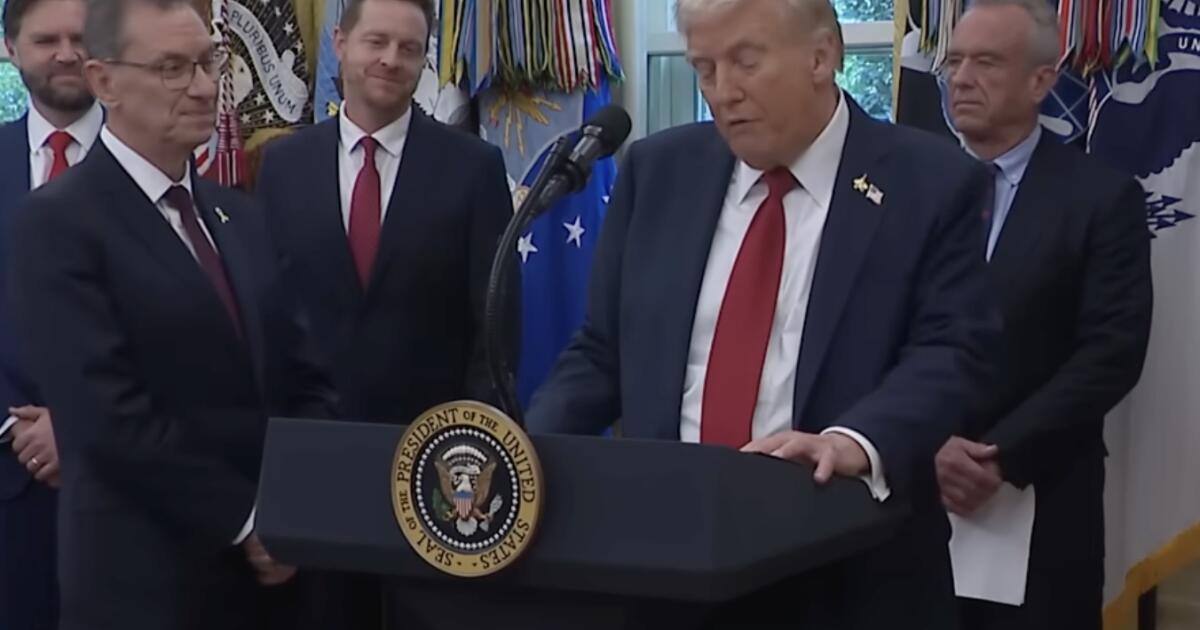UPDATE: A controversial drug pricing deal between President Trump and Pfizer has just been announced, raising significant concerns about its actual impact on American consumers. During a White House event on September 30, 2023, Trump proclaimed the agreement a “massive win for the American people,” but experts are questioning the true benefits of this arrangement.
The deal reportedly allows Pfizer to sell its drugs at “deep discounts” to Americans, with the pharmaceutical giant assuring that U.S. patients will pay lower prices for their medications. However, analysts suggest that the reality is far less optimistic, with skepticism surrounding whether the deal will lead to tangible savings for most Americans.
As part of the agreement, Pfizer will be exempt from a potential 100% tariff that Trump had threatened to impose, a move that experts believe primarily benefits the company rather than consumers. Following the announcement, Pfizer’s stock surged nearly 15% in just five trading days, raising questions about the true nature of the deal.
“We’re still in a place where we don’t know everything we want to know,” says Peter Maybarduk, head of the access to medicines group at Public Citizen. “That’s unfortunate, but it’s also by design.”
Details of the agreement remain largely undisclosed, as both Pfizer and the White House have labeled terms as “confidential.” Public Citizen has filed a Freedom of Information Act request to obtain documentation on the deal, highlighting the lack of transparency from both parties.
The arrangement includes three key components, the first being a commitment from Pfizer to offer state Medicaid programs “most favored nation” prices. However, the details surrounding which countries are included in this “basket” remain unclear, leaving questions about potential savings for Medicaid patients, who already benefit from some of the lowest drug prices in the world.
Moreover, the second aspect involves the launch of TrumpRx, a website aimed at providing discounted medications. Yet, rather than functioning as a direct pharmacy, the site will redirect users to existing consumer-discount programs from drug companies, raising concerns about its effectiveness for uninsured patients who may still find the prices unaffordable.
For instance, while some drugs like Duavee will see a price drop from $203 to $30 monthly, others, such as Xeljanz, will still burden patients with a hefty bill of approximately $3,645 per month after a 40% discount.
Finally, the deal’s third component relates to the ongoing threat of tariffs. Pfizer’s CEO, Albert Bourla, indicated that the prospect of tariffs influenced the company’s decision-making, suggesting the arrangement serves more to protect Pfizer’s profits than to provide relief to consumers.
As public scrutiny intensifies, many are left wondering how this deal will effectively address the high cost of prescription drugs in the U.S. The majority of Americans, particularly those with health plans, may see little to no change, as their prescriptions are already covered under existing programs.
Critics argue that this deal serves as a talking point for the Trump administration rather than a meaningful solution to the rising drug prices that American consumers face. With the potential to extract significant savings from tariff exemptions, this deal appears to be as much about corporate interests as it is about consumer welfare.
As the January implementation date looms, the public and policymakers alike will be watching closely for more revelations about this controversial agreement and its implications for the U.S. pharmaceutical landscape. Stay tuned for further updates as this story develops.
